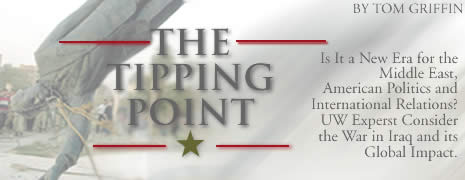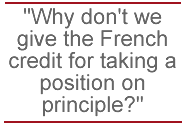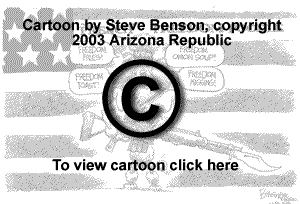

John Keeler![]()
Political Science Professor John Keeler is the director of the European Union Center in the Jackson School of International Studies and chair of the Division of French and Italian Studies in the College of Arts and Sciences. His latest book, published in April, is Defending Europe: The EU, NATO and the Quest for European Autonomy.

As an expert on Europe-and France in particular-you've been interviewed extensively about the European position on Iraq. Can you explain their reasons for opposing the war?
To begin with the French, I think President Chirac simply was not convinced that war was necessary-as of the deadline imposed by the U.S. and the U.K.-if the goal was to eliminate Iraqi weapons of mass destruction. The inspection team seemed to be making progress and there was no apparent short-term threat. Crucial in this regard is that Colin Powell's presentation at the U.N. failed to generate any sense of urgency.
It is worth noting now, in retrospect, that Saddam Hussein either had no remaining weapons of mass destruction-or had them hidden in such a way that they were not accessible for immediate use-or was less evil than portrayed by Bush, since he did not use them even when faced with the most dire circumstances imaginable, the looming destruction of his regime and the probable loss of his life.
Chirac clearly felt that, for Bush, the goal not primarily disarming Iraq but rather producing "regime change" through pre-emptive war. Not only the French, but also the vast majority of our allies were reluctant to grant U.N. legitimacy to what they viewed as a dangerous doctrine of pre-emptive war. Many Americans and British citizens shared this concern.

What about the German and Russian line of reasoning?
Well, for obvious reasons the Germans are very familiar with the tragedy of war. Polls showed that most Germans shared the concerns voiced by the French, and the German government was a coalition of Social Democrats and Greens who won the last election largely by taking a strong anti-war stance. Also, the U.N. holds a special place in the German constitution as the source of legitimacy for the use of German troops. In part for that reason, the Bush administration's denigration of the U.N. did not play well in Germany.

The Russians shared these concerns, but were no doubt even more troubled by the extension of American power that pre-emptive war would bring. There is now a string of new American bases stretching from Eastern Europe to the Middle East.

What about ulterior motives-that the French wanted to preserve their Iraqi oil contracts?
The French certainly had economic interests, including repayment of debts incurred by Saddam. But I don't think economic interests were paramount for the French-or the Bush administration. The easiest way for Chirac to have guarded his economic interests would have been to join the US-UK coalition, which everyone knew would win the war if it were launched. Why don't we give the French credit for taking a position on principle even when it jeopardized their economic interests?

Sounds like you think the French are getting a bad rap.

Cartoon by Steve Benson, © 2003 Arizona Republic
The French bashing has been very upsetting to me. First, the French position reflected majority public opinion throughout Europe-including the U.K.-and was similar to that of virtually all of our allies, including Canada and Mexico. Second, if the French are to be portrayed as ungrateful for America's decisive support in World Wars I and II, aren't some Americans forgetting Yorktown? It was French seapower that bottled up Cornwallis' troops there and assured victory. (I'd like to point out that the treaty ending the Revolutionary War is called "The Treaty of Paris.") Third, it's been 59 years since D-Day. Will we expect a democratic government in Iraq to agree with us on every major issue 59 years from now? If so, we may be disappointed.

Your new book talks about the rise of a common European defense as a counter to the U.S. Do you think the Iraq War will be the tipping point that drives a wedge between the U.S. and its allies in NATO?
It's the latest in a series of tipping points. The Iraq War has reinforced divisions between the U.S. and Europe that developed through the Clinton years and were very pronounced in the Kosovo War, then again in Afghanistan. On many issues, the U.S. and European NATO countries continue to have common interests, so NATO is likely to survive in one form or another. However, it is unlikely to be used again as a vehicle for war-fighting, as in Kosovo.
Tom Griffin, who conducted these interviews, has been editor of Columns for 13 years.
Go To: Page 1 | Page 2 | Page 3 | Page 4
- Return to June 2003 Table of Contents